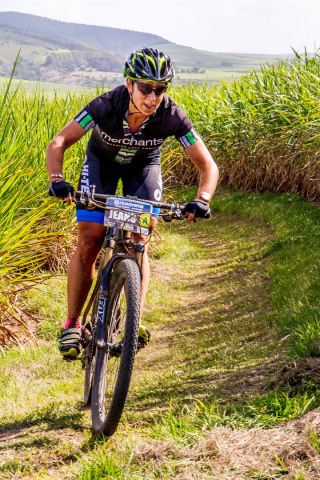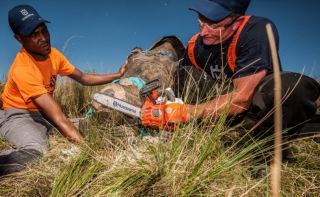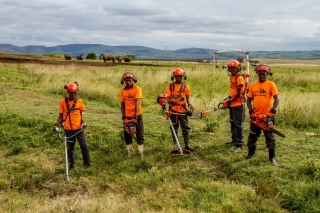Husqvarna Classic Mid-Illovo MTB Challenge & Trail Run – Sunday 30 April 2017
The winner of the women’s race at the 2016 Husqvarna Classic Mid-Illovo MTB Challenge, Jeannie Dreyer, said after the event that she “did not think much more can be done to improve the route.”
She was wrong.
The race organisers have managed to tweak and develop the course for the showcase 60km race this year and have made it even better than last year according to course designer Bruce Smith.
The 60km Husqvarna Classic MTB X-Treme on April 30 will attract the cream of KZN mountain biking and by all accounts the riders in the area are in for a treat with Smith saying the race has to “keep upgrading and changing the trails to remain competitive.”
Smith, the father of last year’s race winner Derrin Smith, is a farmer in the Mid Illovo area and leads the team of local farmers who design and build the 60km course. He said they have introduced more free-flowing single track which is not as technical as in 2016. “The route for the first 30km is similar to last year with lots of single track going through iNsingizi game farm. These are technical but worth it. “After 30km last year the race went on a lot of dirt road,” added Smith.
“As we’re getting more competitive as a race we want to keep the riders coming back so we’ve got to keep upgrading and changing the trails, so we’ve introduced more free-flowing single track in this section. “The final 12km remains very similar to last year, except we have cut out some of the climbs which proved a bit tough for a lot of riders last year.”
But the day is not just about the racing snakes who are looking to test their legs over 60km of challenging mountain biking.
This is the 10th anniversary Husqvarna Classic and over the past decade the race has developed into one of the must-do events on the calendar because it offers something for everybody.
For those mountain bikers who feel 60km is too much of a challenge, there is a standard 45km Safire MTB race and a relatively gentle 18km Gwahumbe Family Ride. And the younger set are also catered for with two 10km fun rides, one for the over 12s and one for the under 12s.
The Husqvarna Classic was also one of the early movers when it came to incorporating trail runs into the day’s activities and they have reaped the rewards with relatively big fields for their 18km and 9km iNsingizi Trail Runs.
The Husqvarna Classic is the fourth leg of the prestigious nine-race Quattro ROAG Series which brings riders together for a Grand Prix-type series of events. Riders win points for each event depending on their finishing position at each race. Stuart Marais is currently leading the men’s MTB ROAG Series tables and is expected to line up and add to his points tally at this popular weekend race.
For the first time this year the trail runs will be incorporated into a ROAG Trail Running Series as well. But perhaps the last word should belong to Dreyer, who has raced and won events all over the world. “Being able to do some game spotting while riding is a real treat,” she said after enjoying her ride to victory in 2016.
“The variety of tracks and scenery within the race keeps it interesting and exciting to ride. “It is most definitely one of the most exciting races in KZN,” – and it now got even better for the 2017 riders.
Entries are open via www.roag.co.za for all events and will close on April 26 at midnight, but late entries will be accepted on the day.
Do your bit! Give an Uzwelo school bag to an underprivileged Mid-Illovo child, when you add a R130 donation to your entry. Registration begins at 05.30 on the day, with the first MTB race (60km) starting at 07h30.
Enter online at www.roag.co.za or contact ROAG on This email address is being protected from spambots. You need JavaScript enabled to view it. or 086 100 ROAG/7624.
Entry Fees
60km Husqvarna Classic MTB X-treme - R190
45km Safire MTB Classic - R160
18km Gwahumbe MTB Family Experience - R140
10km Fun Ride - R70 (free for under 12s)
8km iNsingizi Trail Run - R115
9km iNsingizi Trail Run - R85
For more information, visit www.husqvarnaclassic.co.za
Husqvarna Classic Mid-Illovo MTB Challenge & Trail Run – Sunday 30 April 2017
Get into gear for one of the best-loved (and well-organised) races on the mountain biking and trail running calendar. The 2017 Husqvarna Classic Mid-Illovo MTB Challenge & Trail Run is happening just less than two weeks before the gruelling Sani2C, making it a non-negotiable for those who are following a ruthless training schedule.
“The best single track of any single day event” – that is how some riders have described this MTB route. If that is not enough, the scenery is magnificent.
Part of the ROAG series, there are various races, each of which run the gauntlet from relatively simple to strenuous.
If a game viewing ride is on your sporting bucket list, don’t miss the 40km Safire MTB Classic that traverses two picturesque Game Reserves, Gwahumbe Game & Spa and iNsingizi.
For serious riders, the 60km Husqvarna Classic MTB X-treme will test your resolve, but there are options for the whole family, including the 18km Gwahumbe Family Experience and the 10km Fun Ride.
It’s a great way to get the kids interested in sports and spending more time outdoors and as each of the tracks has different scenery, you could aim to do a different race every year.
The 18km and the 9km iNsingizi trail runs cover rugged terrain through the game reserve.
The trail run events will start early – at 6.30am – so that competitors have an opportunity to do a Biathlon by competing in both the run / walk and mountain bike races.
Do your bit! Give an Uzwelo school bag to an underprivileged Mid-Illovo child, when you add a R130 donation to your entry.
The first 800 entries will receive an Uzwelo goodie bag. Entries close on 26 April 2017 at midnight, but late entries will be accepted on the day.
Registration begins at 05.30 on the day, with the first MTB race (60km) starting at 07h30.
Enter online at www.roag.co.za or contact ROAG on This email address is being protected from spambots. You need JavaScript enabled to view it. or 086 100 ROAG/7624.
Entry Fees
- 60km Husqvarna Classic MTB X-treme - R190
- 40km Safire MTB Classic - R160
- 18km Gwahumbe MTB Family Experience - R140
- 10km Fun Ride - R70 (free for under 12s)
- 18km iNsingizi Trail Run - R115
- 9km iNsingizi Trail Run - R85
For more information, visit www.husqvarnaclassic.co.za
Partnering up in KwaZulu-Natal to save rhinos
The beautiful 700ha Gwahumbe Game & Spa in Mid-Illovo, KwaZulu-Natal, is the latest private reserve to join the ranks of others which have dehorned their rhinos.
Its partnership with Husqvarna and Hilton veterinary surgeon Dr Ryan van Deventer will, hopefully, ensure the survival of the lodge’s last remaining male rhino, eight-year-old Vuyo – and finally allow the expansion of its herd.
Previously, said Gwahumbe Game & Spa director Shanon MacKenzie, “We were too anxious about Vuyo’s safety to allow him to be photographed, and we postponed adding to the herd because of the risk of poachers wanting their horns. We are extremely fond of him: he came here when he was just three. The decision to dehorn him was made with his survival and safety very much at the forefront of our minds.”
The devastating decline in the rhino population – and the poachers’ savagery– is just one of the issues on the agenda for this year’s CITES COP17 Conference* (24 September-5 October in Johannesburg). Sadly, the battle for the animal’s survival has been a losing one, until recently.
A local rhino-dehorning campaign, using Husqvarna outdoor power products, is proving highly successful in the bid to save these beautiful animals from poachers. In KwaZulu-Natal, particularly, the practice is gaining momentum, with increasing numbers of private game reserves voting for this option. The process was first used to help reduce poaching pressure in Zimbabwe in the 1980s. When rhinos are dehorned professionally, the horn is taken above the growth layer of the skin. Rhino horn is like a fingernail: you can cut it or trim it without stopping continued growth. But poachers brutally uproot the entire horn from its base under the skin in the bone.
Vet Dr Ryan van Deventer started working on the dehorning project a year ago in various KwaZulu-Natal areas, including, more recently, at the popular Gwahumbe Game & Spa. “Before dehorning, many rhino owners used ankle bracelets and horn transmitters for monitoring purposes,” he said.
“Although some of them are still resistant to dehorning, as the poaching problem escalates more and more reserves are realising they need to minimise the risk to the animals. It’s not a total solution to the problem but merely part of a holistic plan to try to prevent poaching.”
The Husqvarna Group, a global frontrunner in the manufacture of forest, agricultural and garden power products, has provided Van Deventer with a battery chainsaw and a petrol one – the petrol saw for the initial cutting, and the battery saw for the finer trimming. Some vets who work with rhinos are also relying on Husqvarna’s battery blowers to keep the rhino cool during the dehorning process. Battery products are fuel free so produce no harmful emissions. They are also quieter than their petrol equivalents and lower noise levels mean less anxiety for the sedated animal.
“The Husqvarna chainsaw is quicker than an oscillating saw,” said Van Deventer. “Once the animal is immobilised and stable, the procedure takes about 20-30 minutes.”
He said the Husqvarna blower played a vital role in keeping the rhino’s core body temperature down, which was particularly important during the procedure, especially in the hotter seasons. “There is always a risk with anaesthesia, and added to this is that white rhinos are particularly sensitive to the opioids. So we want to perform the dehorning as efficiently and quickly as possible.”
He said the recommended method to reduce poaching risk was to remove the horn as low to the base as possible, in addition to removing the side walls of the horn. This just leaves a small rounded bump of horn, reducing the poaching risk to the animal.”
Horns do grow back with time, but the rate depends on nutrition. “Animals receiving a lot of supplementary feeding have faster horn growth, so dehorning every 15-24 months is a good guide. But saying that, it’s not good enough to merely dehorn and expect there to be no poaching threat: you must ensure other checks are also in place.”
The plight of the rhino has gained international attention, and around the globe, various campaigns are creating awareness and raising funds to help conserve the animal.
Stefan Terblanche, former Springbok rugby player and CEO of the Rugby Legends, has added his voice to the chorus: “We must do all we can to reduce rhino poaching and I’m proud that we can help save the animal for future generations. It’s far better to have a dehorned rhino that is alive and that we can still enjoy seeing in our reserves.”
Husqvarna South Africa’s marketing manager Jacqui Cochran said: “We are extremely committed to this project, and thrilled that our diverse range of equipment is being used for a cause as worthwhile as saving the rhino.”
For more information about Husqvarna, visit www.husqvarna.co.za and www.gwahumbe.co.za
Ends
Three-Way Partnership Benefits Wildlife in KZN
Husqvarna and Illovo Sugar have linked up with Tala Collection Private Game Reserve to ensure its rhinos and other wildlife are safe and happy and have the right environment in which to thrive. The venture, an essential veld management and rehabilitation project, has also created much-needed employment and skills training.
“The collaboration means benefits for everyone,” said Tala Collection Private Game Reserve general manager Mike Nunan. “Husqvarna has sponsored a comprehensive range of professional equipment – brushcutters, chainsaws, clearing saws, etc – for a work team to eliminate exotic and alien vegetation. This local labour, in turn, is sponsored thanks to a generous donation from Illovo. They are also doing some major rehabilitation, which is all making a huge difference to the animals’ environment.”
While removing alien plants is imperative, there is also a need to thin down over populated indigenous plants. “Within the reserve are areas with thick vegetation and masses of self-sown acacia. This creates a canopy so light can’t get in, and grasses can’t grow, meaning browsers and grazers, like rhino for instance, won’t graze there. So with the help of the Husqvarna’s powerful equipment, the bush-clearing team is opening up these areas to the environment: when the rain comes, and these parts are exposed to light, sunshine and animals droppings, the primary grasses will come back. This helps spread the animals out so they don’t all graze in one area and destroy it.”
The 3000ha reserve, with no large predators, is very well stocked with a diversity of game, ranging from the tiny mongoose up to the biggest of all southern African antelope – the eland. It boasts about 20 species of antelope, including oribi, bushbuck and reedbuck, with general game in abundance. It is a mix of acacia thornveld, open grassland and sensitive wetland.
Husqvarna Group has established itself as a global frontrunner in the manufacture of forest, agriculture and gardening power products, said marketing manager Jacqui Cochran. “We are extremely committed to the project, and are encouraged to see our diverse range of machines being put to use in such a meaningful project, with spin-off benefits for everyone - including the labour team from the local communities, who have been able to learn new skills using our equipment.”
For Illovo, Africa’s biggest sugar producer, this is the second project with which they’ve been involved at Tala Collection Private Game Reserve. Last year they helped have the resident rhinos tagged with GPS monitoring devices so their whereabouts could be tracked 24 hours a day. They also support the on-site anti-poaching team who patrol the reserve day and night. Now the sugar company has come to the rescue again, donating funds for the workforce needed to clear the area in a continued effort to protect these rhinos and create skills development for the local community.
Said Darrell de Wet, Illovo marketing manager: “It’s important to keep the animals safe, but just as important to ensure their habitat and environment is as it should be. We welcomed the opportunity to again be involved in this community and play our part in helping preserve the environment.”
For more information, visit the following websites:




